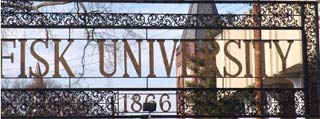
In its 2007 petition seeking court permission to sell a half-share of its Stieglitz Collection to Alice Walton‘s Crystal Bridges Museum, Fisk University gave the following (now outdated) justification for the proposed transaction:
If Fisk’s current financial condition doesn’t improve, there is a high likelihood that it may lose its accreditation. Fisk is accredited by the Southern Association of Colleges and Schools (SACS), which will review the University’s accreditation status in 2009. In its current condition, Fisk will fail to satisfy the criteria established by SACS to establish financial viability.
The petition goes on to enumerate all the dire misfortunes that would hobble or destroy Fisk if accreditation were lost, including the likelihood of being “forced to declare bankruptcy, and/or dramatically scale back or cease operations.” The university asserted that it needed to accept Walton’s $30-million offer to convince SACS of its financial viability.
That was 2007. Now, this just in from Fisk:
The Southern Association of Colleges and Schools (SACS) has reaffirmed the accreditation of Fisk University for 10 years.
In reporting this welcome news, Jennifer Brooks of the Tennessean writes:
The university has struggled financially for years, but university
officials say they see signs that things are looking up. Applications
for enrollment at the historically black university rose from just 300
last year to more than 900 so far this year. Enrollment had dropped 10
percent this year, compared to 2008.Earlier
this year, Fisk President Hazel O’Leary informed alumni that donations
to the school had dropped 40 percent as the economy soured in 2008.
O’Leary responded with a round of cutbacks that trimmed the
university’s budget by 15 percent this year.
In other Fisk financial news, the university last month announced that it would “receive the Historically Black Colleges and Universities Master’s Degree Grant (Title VII) Award for $3 million from the United States Department of Education, to assist Fisk graduate students in obtaining advanced degrees in the natural and physical sciences, in disciplines in which African Americans are underrepresented.”
Fisk’s new Strategic Plan
for 2009-2013 seems to bolster the case for full retention on campus of the Stieglitz Collection. On the plan’s second page, Fisk boasts that it is “home of world-renowned…Stieglitz Collection
of Modern Art…and other artistic treasures.” On p. 4, the university asserts that one of the
“key components of Fisk mission” is a “culturally rich environment.”
Meanwhile, the Georgia O’Keeffe Museum’s court appeal related to the Stieglitz Collection case is still pending. The museum maintains that if financial circumstances make it impossible for the
university to comply with the conditions of O’Keeffe’s donation, the collection that she bestowed upon Fisk should be forfeited to the Santa Fe museum, which says that it is “successor in interest” to O’Keeffe. A motion for permission to appeal the decision by the Tennessee Court of Appeals that the O’Keeffe Museum lacked legal standing is now before the state’s Supreme Court.
If Fisk is still determined to do the Walton deal, the case returns to Davidson County Chancery Court for a determination of whether it can legally deviate from donor O’Keeffe’s written instructions that Fisk “will not at any time sell or exchange any of the objects” from the Stieglitz Collection.
In that same court, Chancellor Ellen Hobbs Lyle issued a 2008 decision rejecting the half-share sale. But the Court of Appeals, in the same decision removing the O’Keeffe Museum from the case, rejected some of Chancellor Lyle’s reasoning and said that the Walton deal might be permissible if strict compliance with O’Keeffe’s conditions had
(due to Fisk’s serious financial difficulties) become impracticable or
impossible.
I sent two e-mails requesting comment, on Monday and yesterday morning, to two Fisk press officers. I sent another e-mail early yesterday afternoon to the university’s lawyer in this case. So far, no replies. What I asked is whether, in light of the SACS reaccreditation, Fisk’s determination to pursue monetizing its collection has changed.
If I hear more, you’ll hear more.
